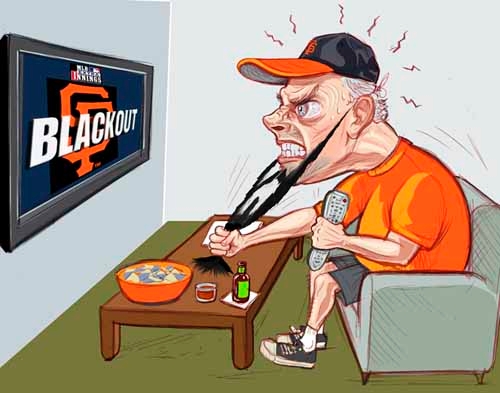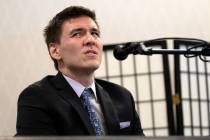Decades-old blackout rules leave Major League Baseball fans in the dark
Baseball fan Barry Lieberman does not like the San Francisco Giants, and not only because they are the reigning World Series champions.
The Las Vegas attorney also has a disdain for the Los Angeles Dodgers, San Diego Padres and Arizona Diamondbacks -- four of six major league franchises that hold TV rights to Southern Nevada as a "local market" and keep him from watching his favorite team.
"I'm a Mets fan, but if they play the Giants I can't see the game here," said Lieberman, who has lived in Las Vegas since 1982.
Lieberman, like many baseball fans, once paid about $200 per year for Major League Baseball's premium Extra Innings package only to discover that a league blackout policy originating in the 1960s -- three decades before the premium package was first offered in 1996 -- kept him from watching his beloved Mets any time they played the Giants, Dodgers, Padres or Diamondbacks. He subscribes to Cox Cable.
Lieberman first was angry at Cox, but quickly learned it wasn't the fault of the local cable system.
"We have no influence over what games are blacked out, and we think that (blackout) rule stinks," said Juergen Barbusca, manager of communications for Cox Communications in Las Vegas. "We have voiced our opinion, but it doesn't influence what happens."
In addition to the Giants, Dodgers, Padres and Diamondbacks, the Los Angeles Angels and Oakland Athletics hold contracts that claim Southern Nevada as part of TV markets. The Giants and A's, the two Bay Area teams, play some 570 miles from Las Vegas.
Baseball's blackout policy limits what games can be viewed through broadcast, cable and satellite systems as well as on the Internet.
Even to the most astute, the policy is more convoluted than Abbott and Costello's classic "Who's on First?" routine.
No high-ranking MLB executive could be reached to explain the policy or the logic behind it. Inquiries, instead, were directed to Matt Bourne in baseball's media relations department. He was the only person permitted to discuss the policy and its effect on Southern Nevada.
"I would call it a television territory," Bourne said. "(There is) no distance limit, but Las Vegas is in a unique situation because it is a big city that doesn't have a club but is centrally positioned near teams."
Geographic boundaries might make sense for teams in San Diego, Los Angeles and Arizona, whose distances from Las Vegas range from 260 to 340 miles. And Cox Cable, the area's largest service provider, does televise nearly all games for the closest teams -- Dodgers, Angels and Padres -- though some can be affected by the restrictions.
"We don't always know when a game will be blacked out until the last minute," Cox's Barbusca said.
Bourne admitted that market restrictions have nothing do with televised games potentially impacting game attendance.
No officials from any of the six teams that stake claim to Southern Nevada returned phone calls to the Review-Journal.
One professional baseball executive who requested anonymity said he thinks the policy enables teams to claim a larger TV audience, which allows them to charge more for advertising and helps in negotiating better TV deals within their primary markets.
When West Coast teams that existed in the 1960s first claimed Southern Nevada as part of their home markets, the Las Vegas metropolitan area had a population of 200,000. Today, the population is more than 2 million.
"It's an enormously complicated matter in terms of trying to get as much baseball out there while protecting the local television rights of the clubs. Clubs sell regional TV rights," Bourne said.
Bourne explained that discussions about the policy are "ongoing" at MLB. However, it has not been widely addressed publicly since the 2008 Winter Baseball Meetings in Las Vegas.
Bob DuPuy was MLB's president and chief operating officer then, second only to commissioner Bud Selig in baseball's administrative hierarchy.
"We've been working on solving (the blackout issue), and it is a high priority for the commissioner to ensure that as many games are available on the out-of-market package as are feasible," DuPuy told the Review-Journal at the time. "You can tell the fans in Las Vegas that the commissioner is committed to getting as many games cleared as possible.
"It's one thing if (teams are) broadcasting in the market, but if they're not broadcasting into the market, we ought to figure out a way to get it done."
DuPuy, an attorney, left MLB in 2010 and is now a partner with the New York City law firm of Foley & Lardner. He did not return a call seeking further insight into the issue.
The premium MLB Extra Innings package, available on Cox and the DirecTV satellite system, touts on its website that you can "watch every out-of-market game LIVE." The availability is restricted by the blackout policy.
"That's part of the problem; sometimes you don't know," Barbusca said of which games are provided to Cox. "We don't control what signal is sent to us."
Dish Network, meanwhile, has chosen not to offer the package because "demands made by MLB were not in the best interest of our customers," an explanation at DishNetwork.com reads. But the satellite service offers several regional sports networks, including one from Comcast that airs Giants games in Southern Nevada.
The seemingly unpredictable nature of game availability on the premium package also frustrates sports books and venues that show sports such as baseball. They face the same restrictions as the public.
"The policy hurts us," said Jay Kornegay, vice president of race and sports for the Las Vegas Hilton. "We always have visitors that come in to watch their team and they aren't happy when (the game is) blacked out."
Some nationally televised games on ESPN and Fox Sports also can be restricted by the blackout policy.
"We'd pay for every game if we could. It's frustrating for us and for our customers. But we're at the mercy of Major League Baseball's policy," Kornegay said.
As are all Southern Nevada baseball fans.
Contact reporter Jeff Wolf at jwolf@reviewjournal.com or 702-383-0247.
MLB BLACKOUT POLICY
Live regular-season baseball games can be blacked out in each Major League Baseball team’s designated “home” television territory regardless of whether that team is playing at home or away.
Southern Nevada is considered a “home” market for six teams: the Los Angeles Dodgers, Los Angeles Angels, San Diego Padres, Arizona Diamondbacks, San Francisco Giants and Oakland Athletics.
MLB has not provided the specific criteria that define a “home” market, which first was determined in the 1960s.
Cox Cable provides a nearly full schedule of games for the Dodgers (Fox Sports West, Channel 49), Angels (Prime Ticket, Channel 50) and Padres (Cox 96).
Southern Nevada sports books or bars are able to provide only MLB games that are available to the public subscribing to premium services through Cox Cable and DirecTV.
LAS VEGAS REVIEW-JOURNAL




























